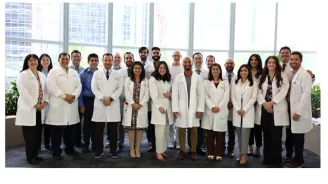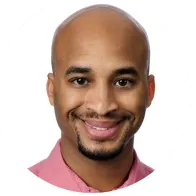
About the Program
I would like to extend a warm welcome to you as you visit us at AdventHealth Orlando Internal Medicine Residency. Our mission is to “Extend the healing Ministry of Christ” in all we do. This means that regardless of background, faith, or nationality, each patient that walks through our doors is invited to be an honored guest with us; and we provide whole person and comprehensive care through this lens.
AdventHealth Orlando Hospital is right in the center of Orlando, and is the largest hospital in Central Florida, at nearly 1,400 beds. AdventHealth Orlando offers medical care from primary through quaternary levels, including bone marrow, kidney, liver, pancreas, heart and lung transplant services, as well as world-renowned robotic and minimally invasive surgeries. AdventHealth Internal Medicine Residency at Orlando is part of a blossoming Academic center, which has primary care and surgical residencies as well as many fellowship opportunities (e.g. Gastroenterology, Cardiology, Critical Care, Geriatrics). We blend the educational benefits of patients and physicians at every medical care level into a unique and complete Internal Medicine residency experience, all within one medical center. Our training program philosophy starts with a caring, humane attitude to each person we encounter. To this, we add the highest possible level of learning expectation of our residents, role modeled by dedicated faculty. Surrounded by the very best medical facilities and the greatest variety of patients anywhere, we will graduate the most capable internists in the country.
Dwayne Gordon, MD
Program Director
Program Leadership
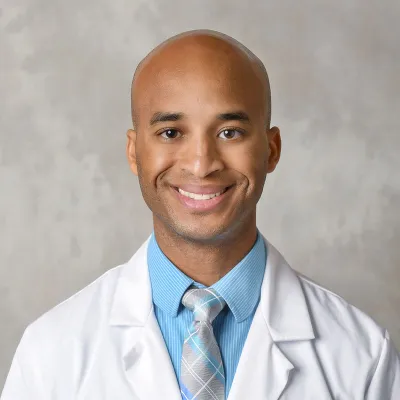
Dwayne Gordon, MD
Program Director
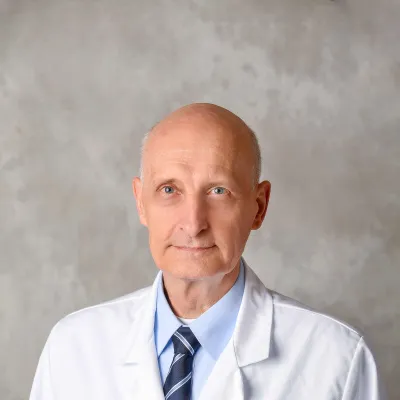
George Everett, MD, MS, FACP
Academic Chair
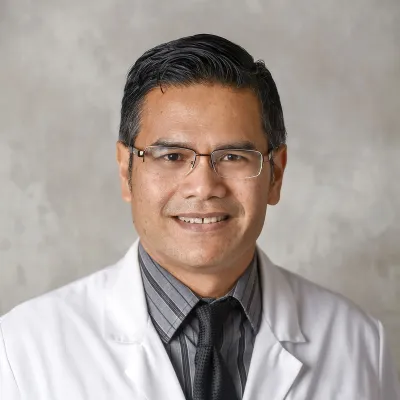
Daniel Tambunan, MD
Associate Program Director
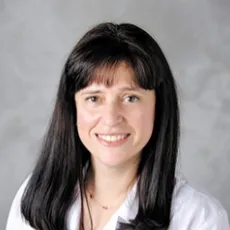
Karen A. Echeverria-Beltran, MD, FACP
Associate Program Director
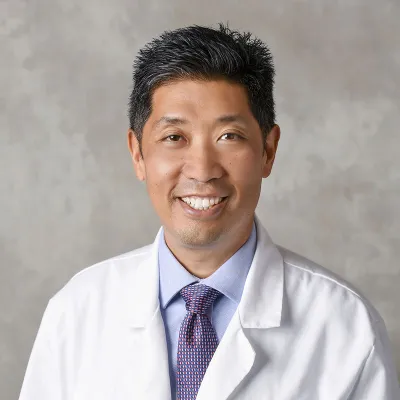
Vincent P. Hsu, MD, MPH
Director of Infection Prevention, Assistant Director
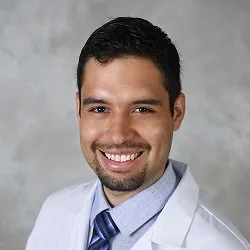
Luis Isea, MD
Assistant Program Director
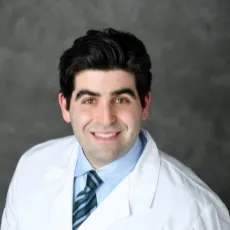
Edward Maharam MD
Assistant Program Director
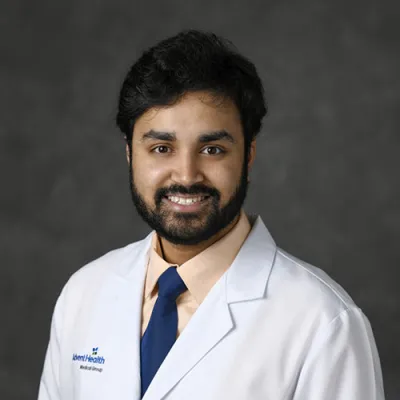
Asef Mahmud MD
Assistant Program Director
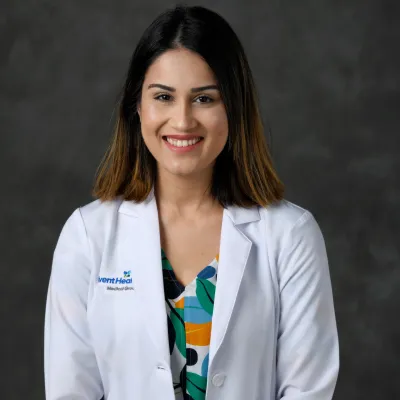
Tasnuva Anindita Mahmud, MD
Assistant Program Director
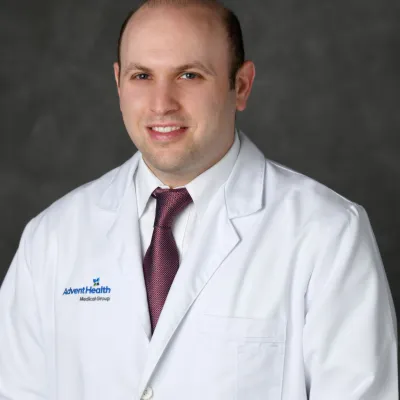
Mohmad Sharbatji, MD
Assistant Program Director
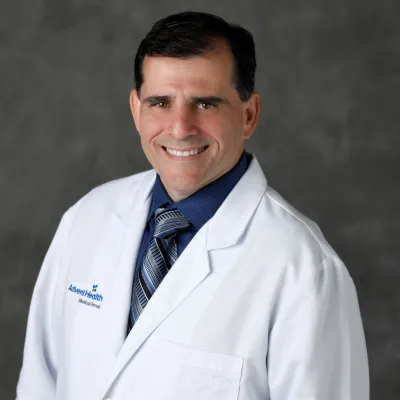
Ricardo Conti, MD
Assistant Program Director
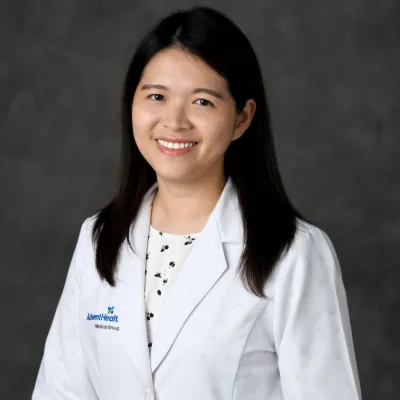
Yu Ya Nway, MD
Assistant Program Director
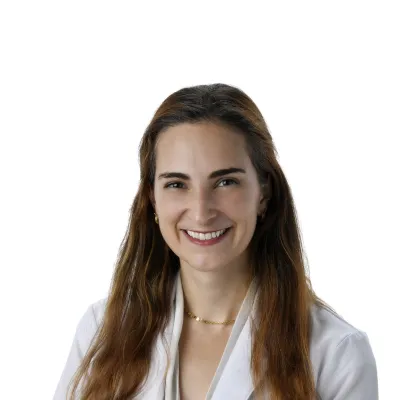
Austin Coye, MD
Assistant Program Director
Current Residents
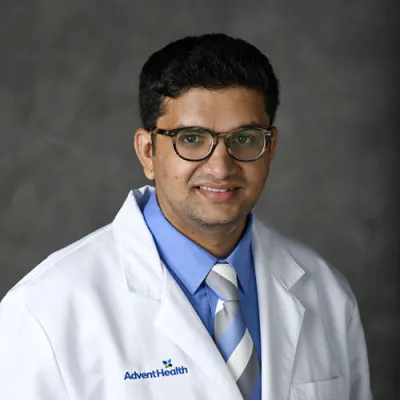
Swotantra Gautam, MD
PGY-3
Chief Resident
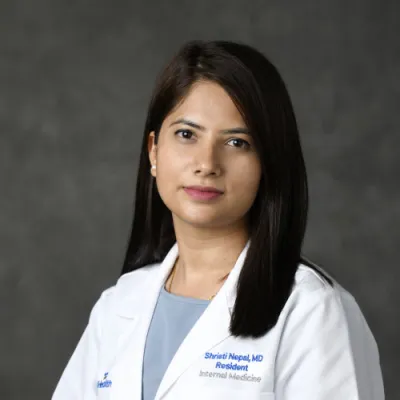
Shristi Nepal, MD
PGY-3
Chief Resident
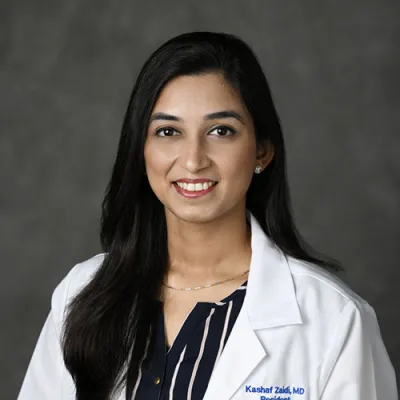
Kashaf Aqeel Zaidi, MD
PGY-3
Chief Resident
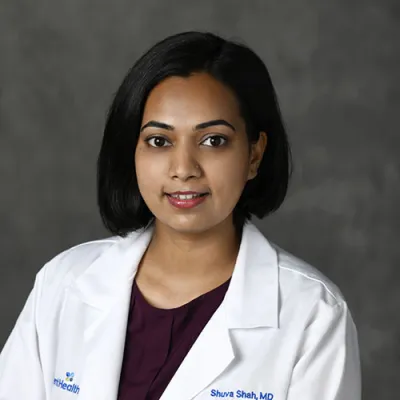
Shuva Shah, MD
PGY-3
Chief of Research
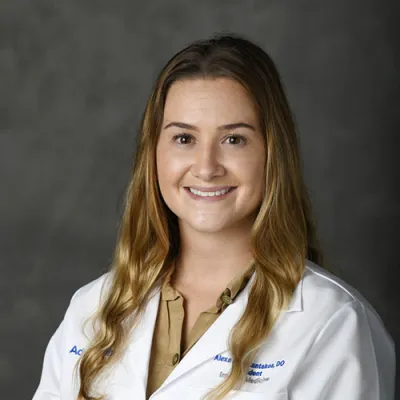
Alexa Constantakos, DO
PGY-3
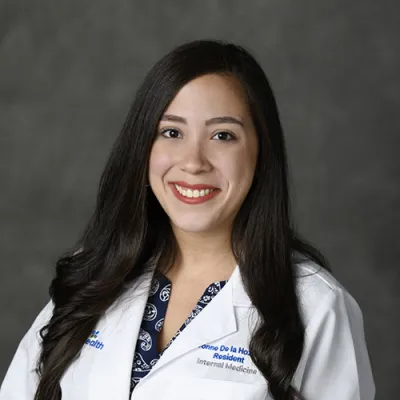
Ivonne De La Hoz Molina, MD
PGY-3
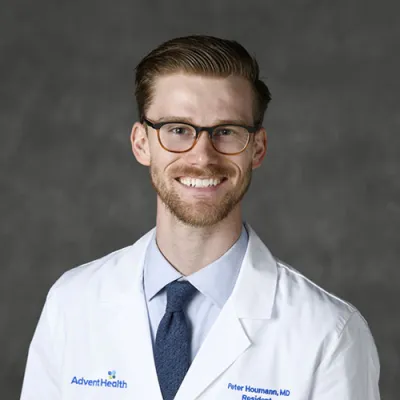
Peter Houmann, MD
PGY-3
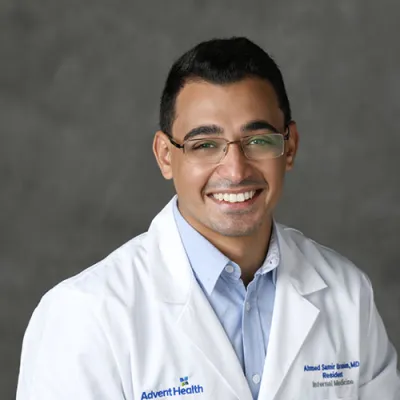
Ahmed Ibrahim, MD
PGY-3
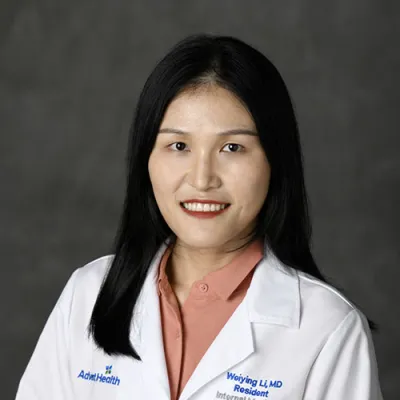
Weiying Li, MD
PGY-3
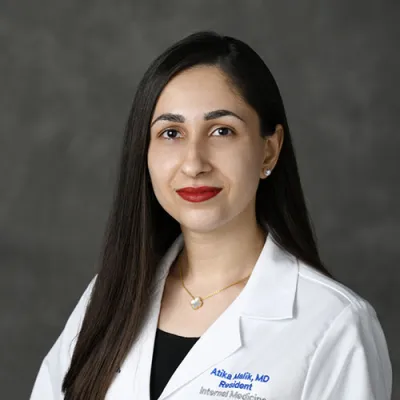
Atika Malik, MD
PGY-3
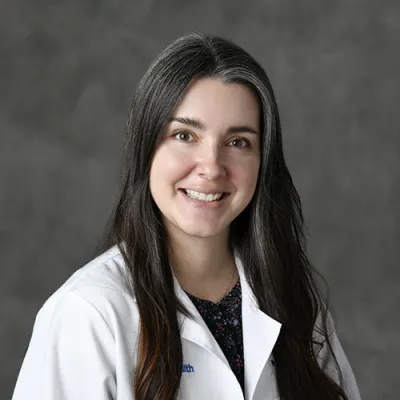
Nancy Zerpa Lira, MD
PGY-3
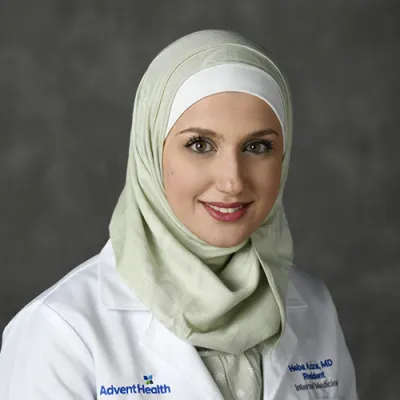
Heba Aziza, MD
PGY-3
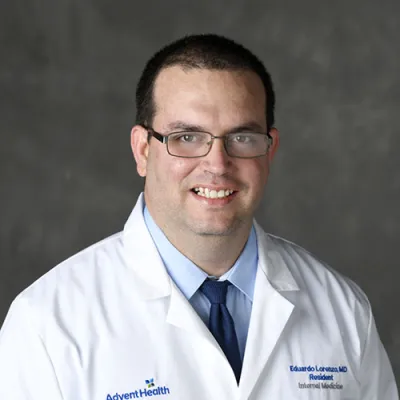
Eduardo Lorenzo, MD
PGY-3
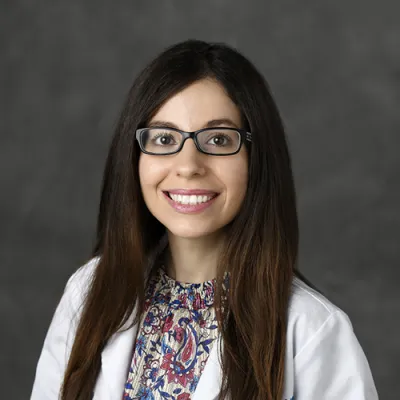
Rola Ali, MD
PGY-3
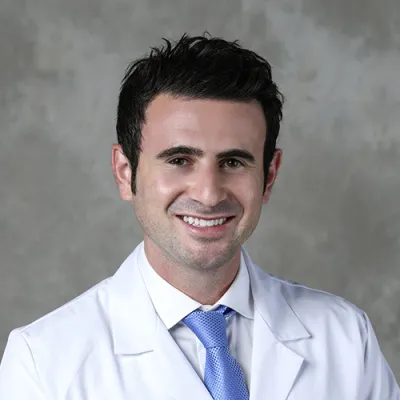
Alex Herbert, MD
PGY-2
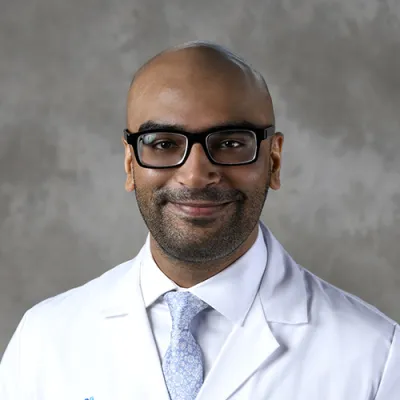
Ali Waqar Chaudhry, MD
PGY-2
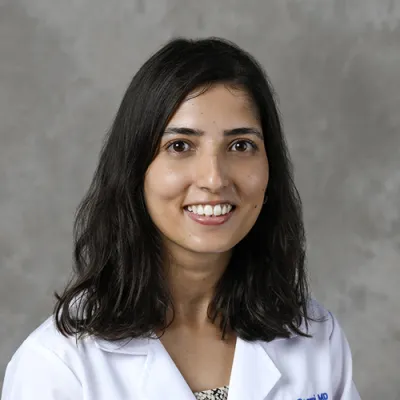
Archana Regmi, MD
PGY-2
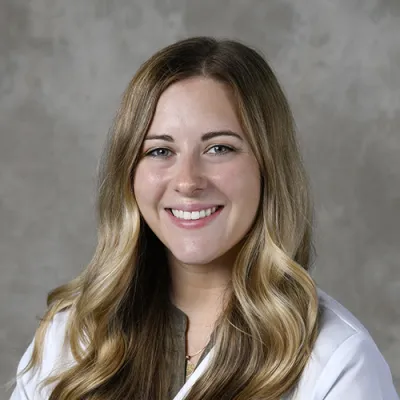
Jade Murphy, DO
PGY-2
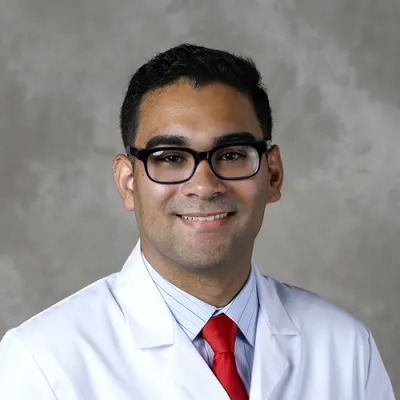
Jordan Lebron, MD
PGY-2
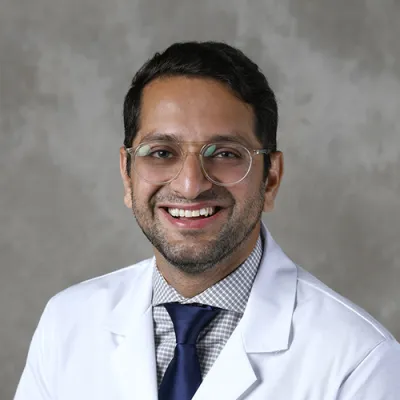
Nihal Khan, MD
PGY-2
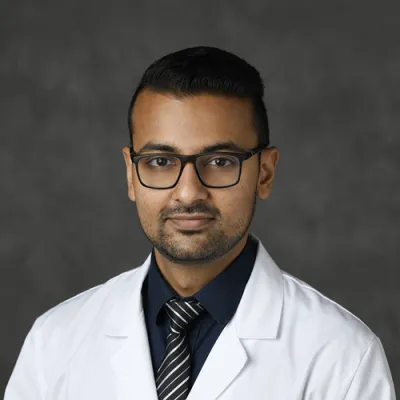
Parikshit Chapagain, MD
PGY-2
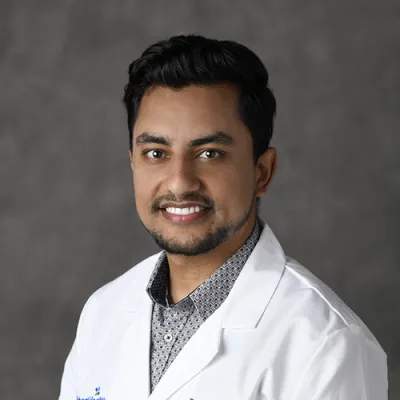
Ranjit Sapkota, MD
PGY-2
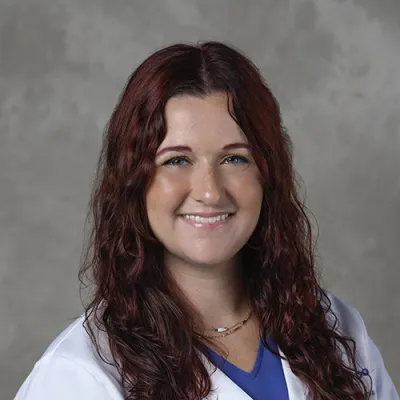
Grayson White, DO
PGY-2
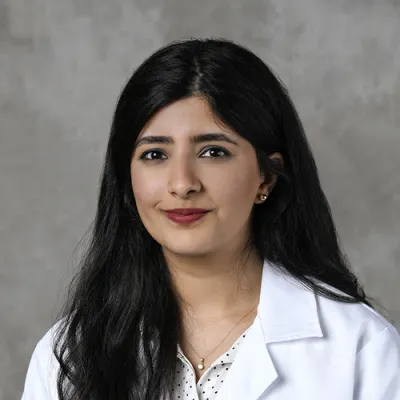
Amna Malik, MD
PGY-2
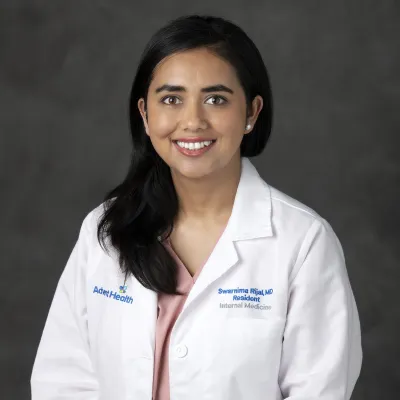
Swarnima Rijal, MD
PGY-2
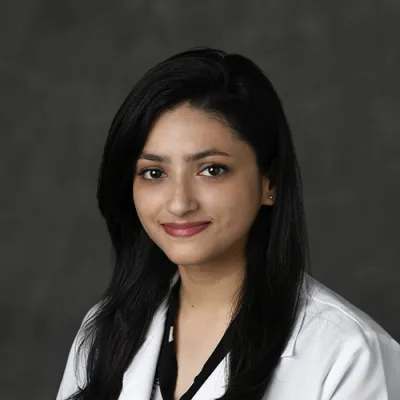
Sana Shahid, MD
PGY-2
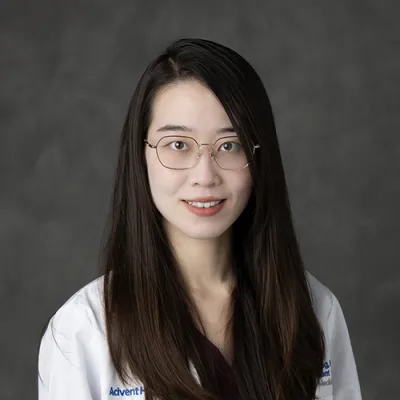
Xiaojin Song, MD
PGY-2
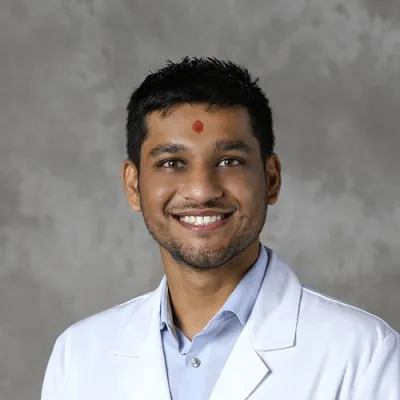
Vikram Patel, MD
PGY-2
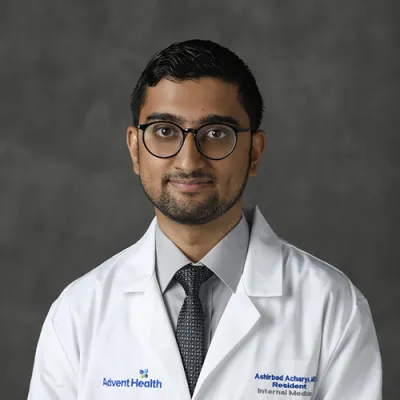
Ashirbad Acharya, MD
PGY-1
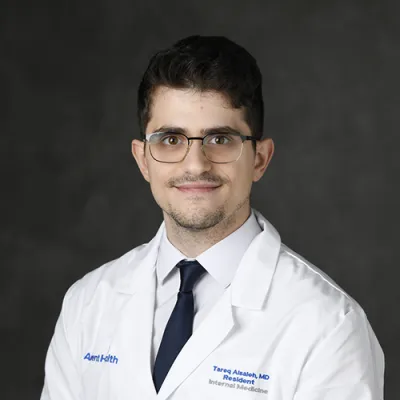
Tareq Alsaleh, MD
PGY-1
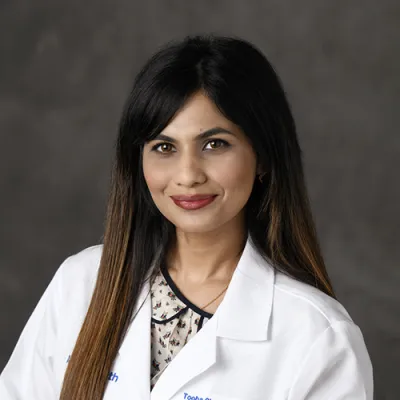
Tooba Shaukat Butt, MD
PGY-1
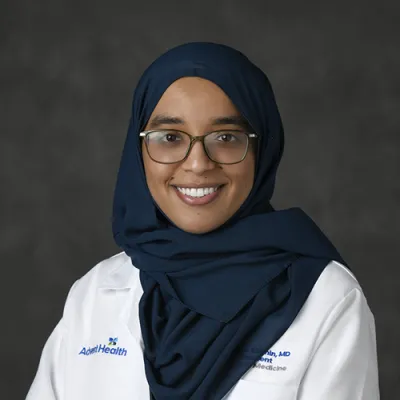
Magda Elamin, MD
PGY-1
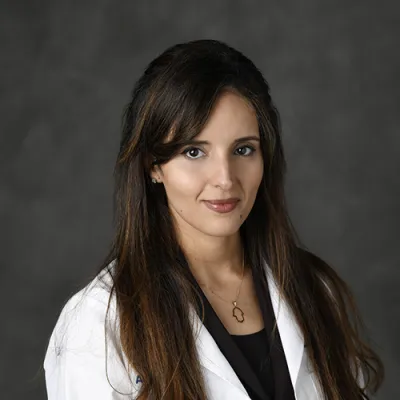
Mariem Galuia, MD
PGY-1
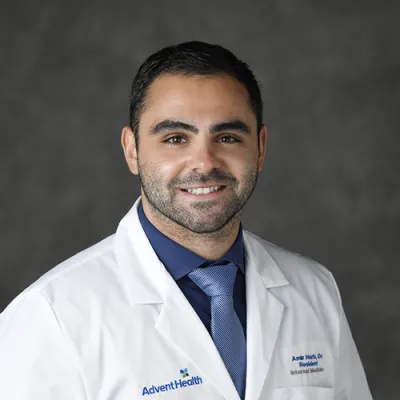
Amir Harb, DO
PGY-1
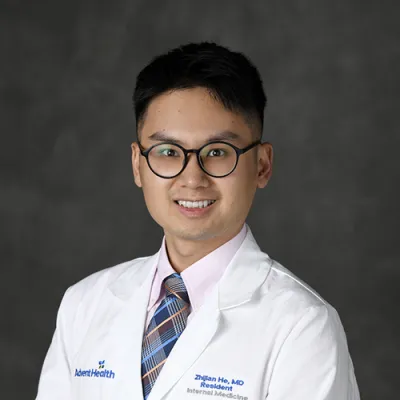
Zhijian He, MD
PGY-1
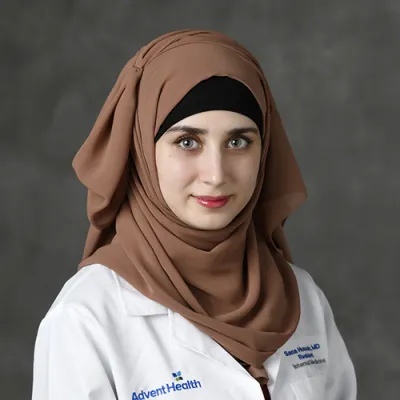
Sana Hussain, MD
PGY-1
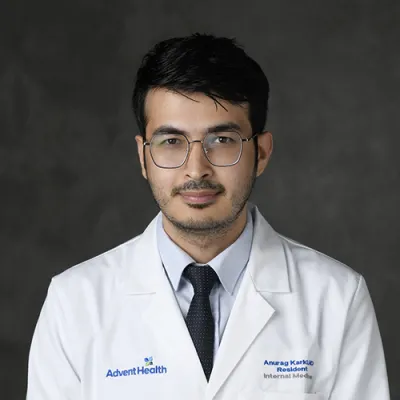
Anurag Karki, MD
PGY-1
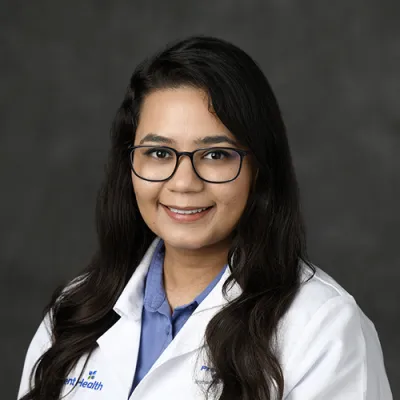
Prachi Mann, MD
PGY-1
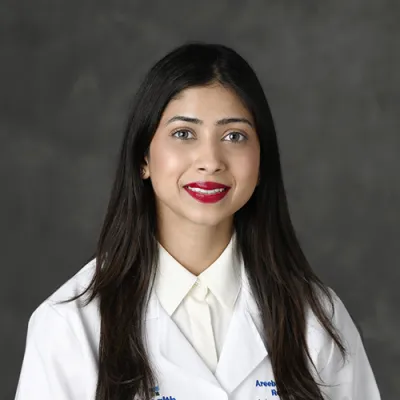
Areeba Meraj, MD
PGY-1
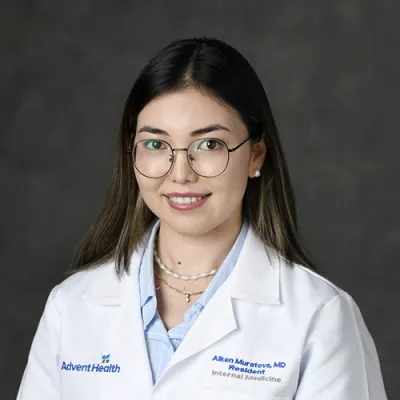
Aiken Muratova, MD
PGY-1
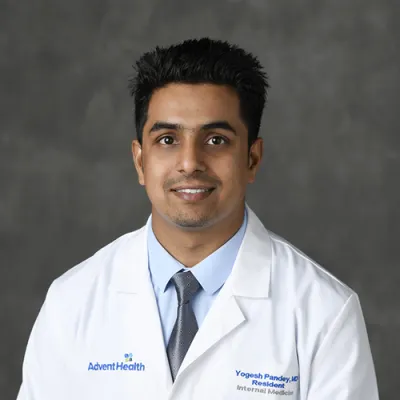
Yogesh Pandey, MD
PGY-1
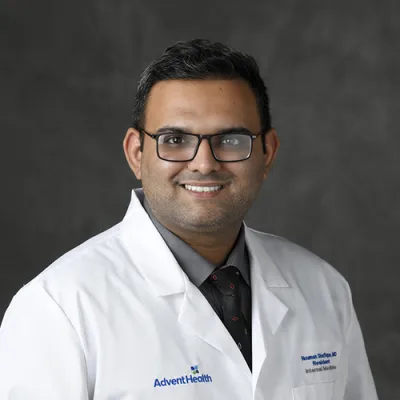
Nouman Shafique, MD
PGY-1
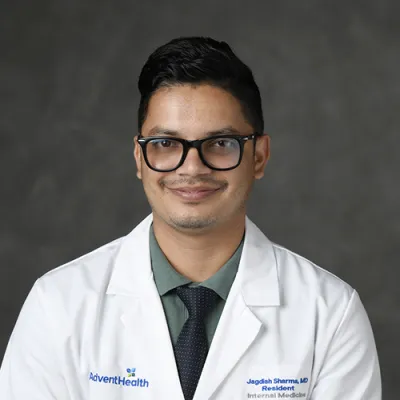
Jagdish Sharma, MD
PGY-1
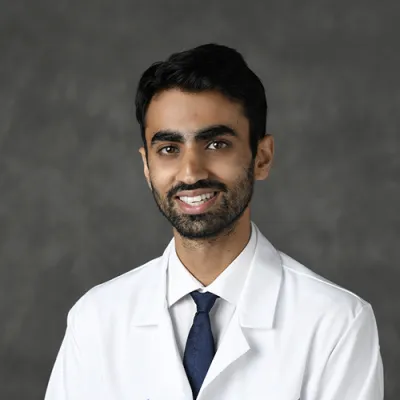
Muhammad Zaeem, MD
PGY-1
Internal Medicine Residency Life

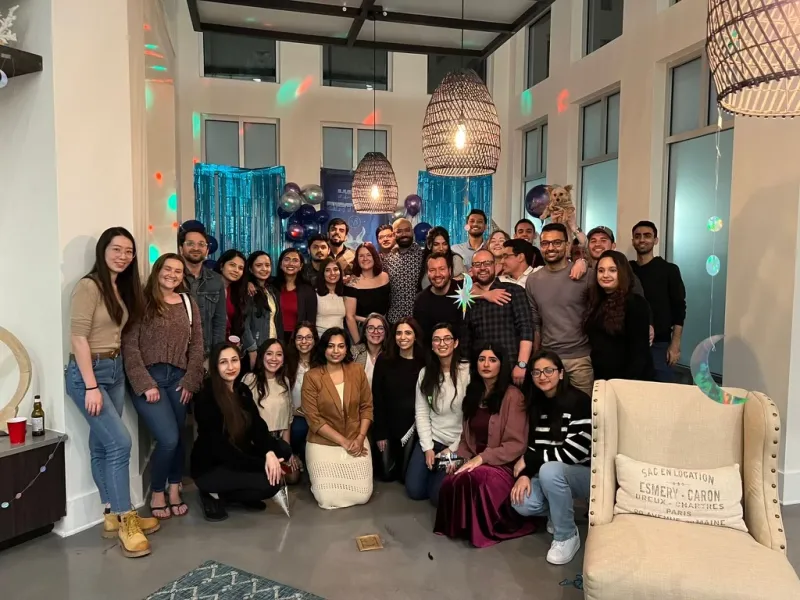
Birthdays call for a celebration - a combined birthday for our Capricorns in 2024
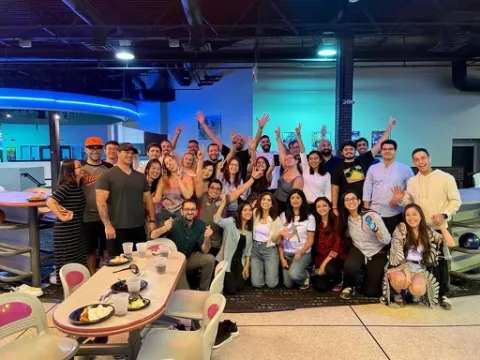
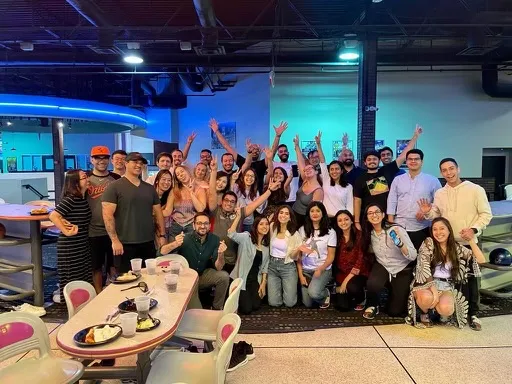
IM Orlando Quarterly Resident Wellness Bowling Event

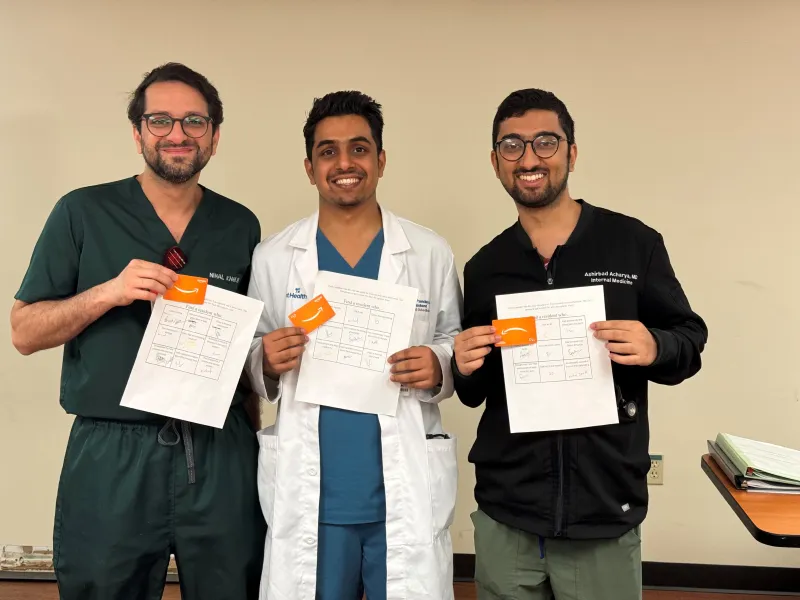
Our social Bingo winners for a Wellness event!
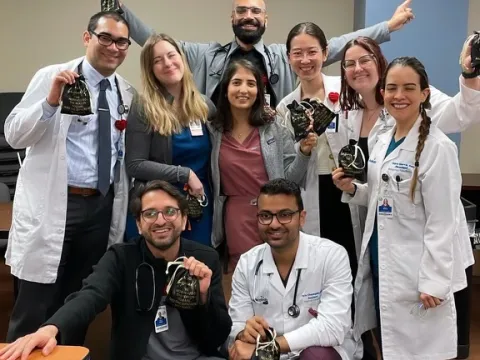
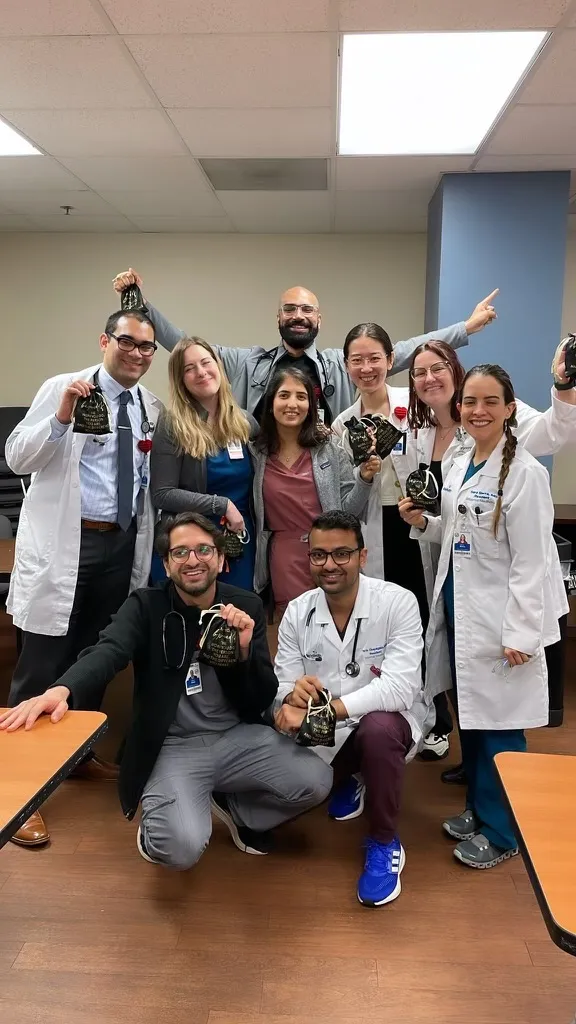
Our interns after receiving goody bags containing personalized messages from their mentors for 'Thank a Resident Day'!
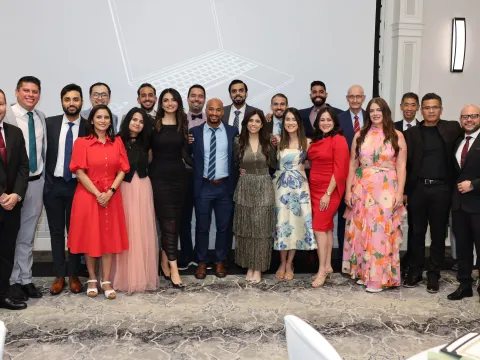
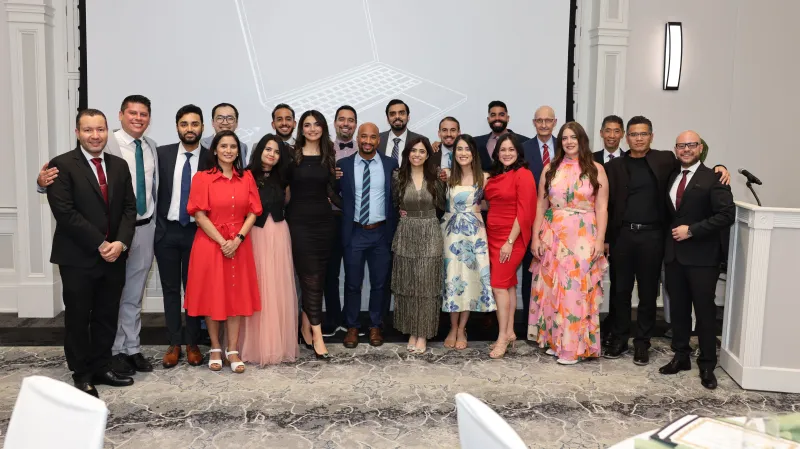
Our graduating Class of 2024 with the faculty at the Graduation Ceremony!
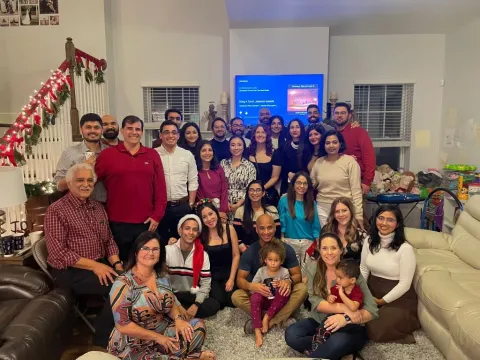
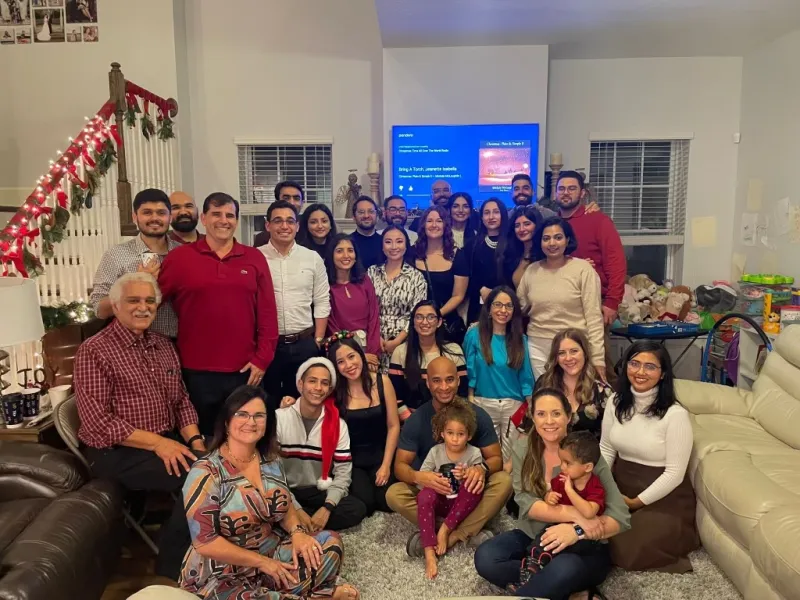
Every December our Program Director, Dr. Gordon hosts our annual Christmas party that's known for its amazing food, great company and lots of fun!
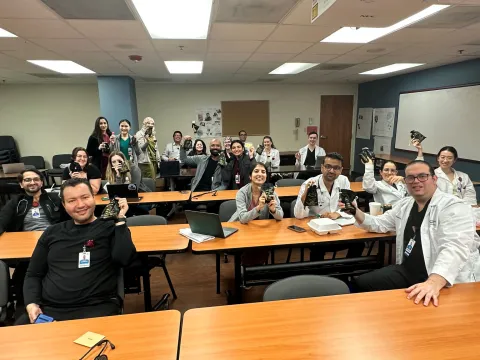
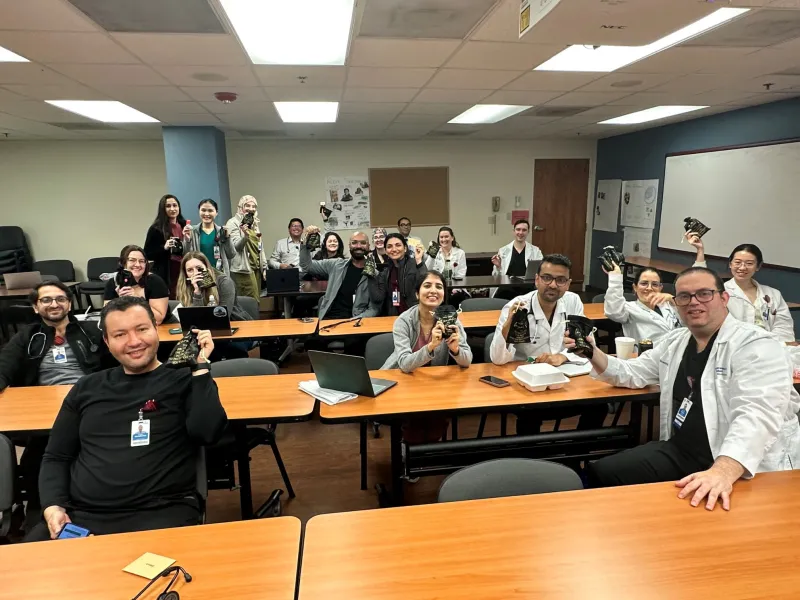
A token of appreciation for our residents on 'Thank a Resident Day'!
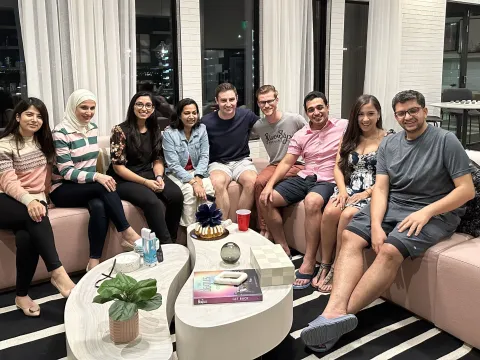
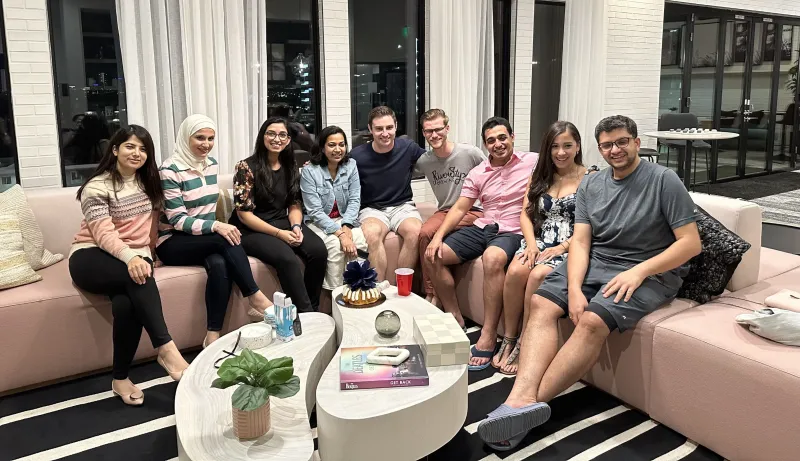
Class of 2025 celebrating the end of the first quarter of their intern year training!
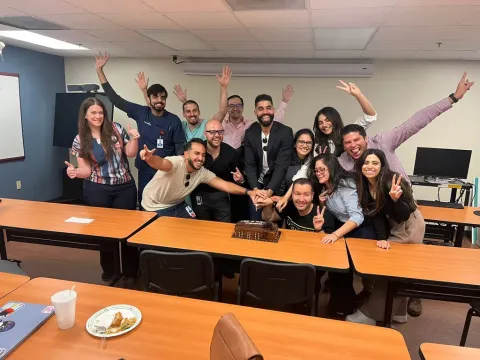
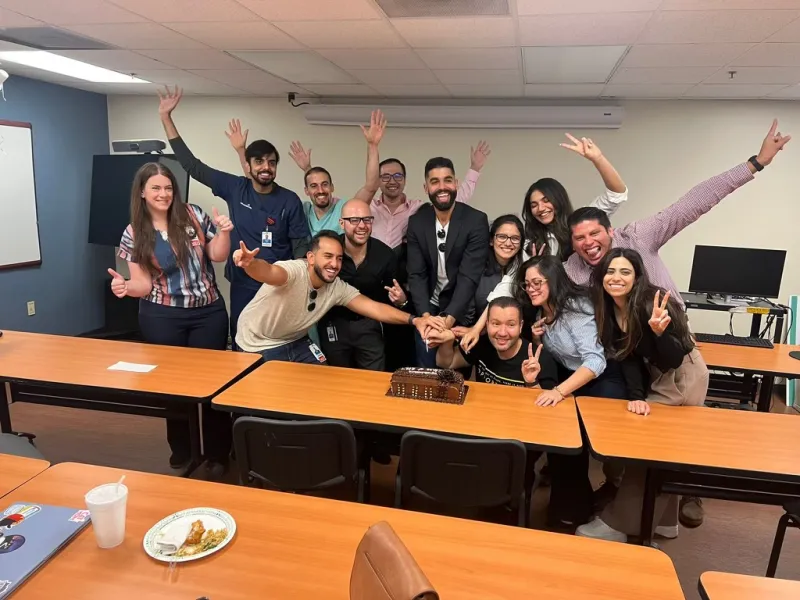
Graduating Class of 2024 celebrating the end of their training at the Farewell Potluck!
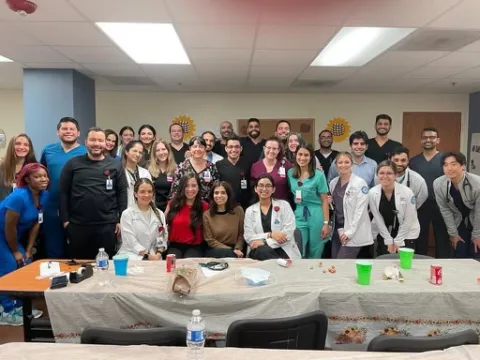
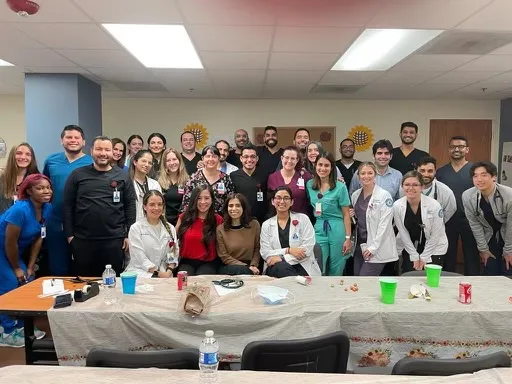
Every year IMR family comes together to share a meal and be grateful for having each other around for our Thanksgiving Potluck!
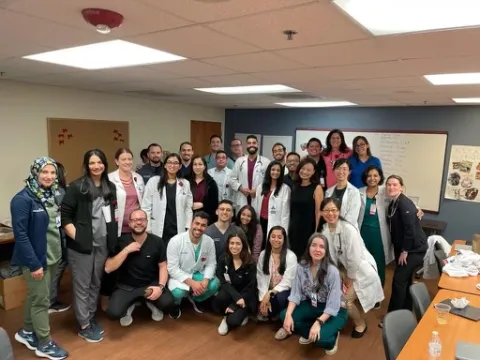
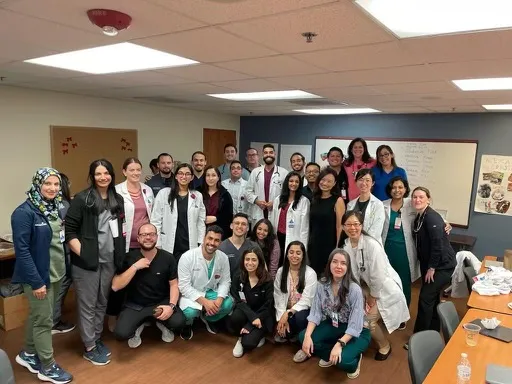
Bidding farewell to our Class of 2023!
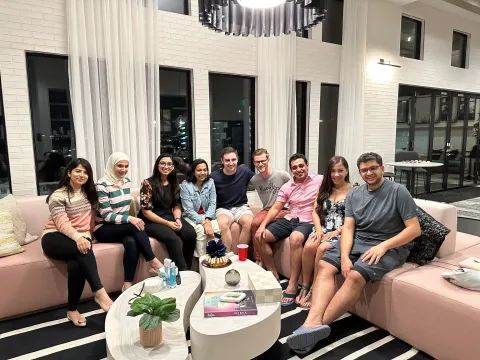
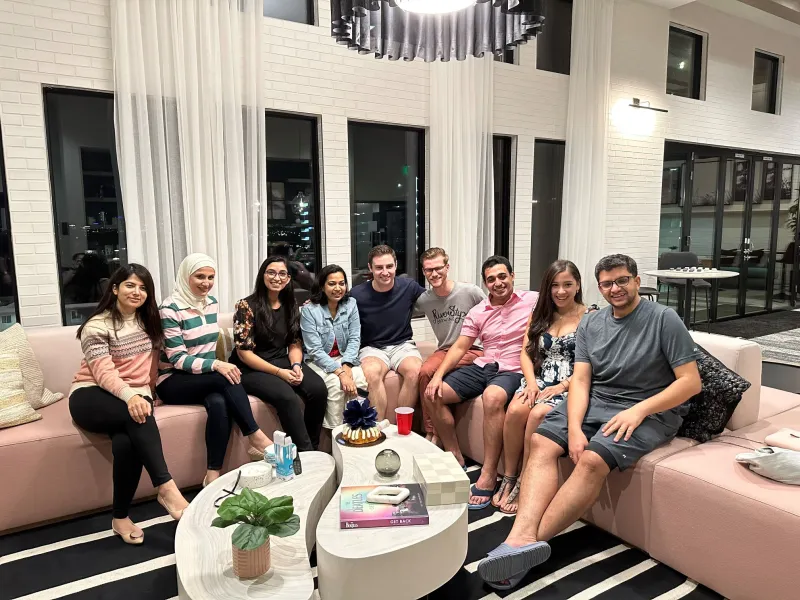
Class of 2025 celebrating the end of the first quarter of their intern year training!
Categorical Curriculum
Categorical track curriculum provides more exposure to inpatient medicine with resident clinic half-days once a week.
| PGY-1 Rotations | Duration |
|---|---|
| General Medicine Inpatient | 6 Blocks |
| Critical Care Medicine | 1 Block |
| Night Float | 1 Block |
| Research | 1/2 Block |
| Procedure Team | 1/2 Block |
| Emergency Medicine | 1 Block |
| Ambulatory | 1 Block |
| Subspecialty Rotation | 2 Blocks |
| PGY-2 Rotations (varies) | Duration |
|---|---|
| General Medicine Inpatient | 3 Blocks |
| Critical Care Medicine | 2 Blocks |
| Night Float | 1 Block |
| Elective | 1-2 Blocks |
| Subspecialty Rotation | 4-5 Blocks |
| VA | 1 Block |
| PGY-3 Rotations (varies) | Duration |
|---|---|
| General Medicine Inpatient | 3 Blocks |
| Critical Care Medicine | 2 Blocks |
| Night Float | 1 Block |
| Elective | 1-2 Blocks |
| Subspecialty Rotations | 2-3 Blocks |
| VA | 1 Block |
| Geriatrics | 1 Block |
| General Medicine Outpatient | 1 Block |
| Procedure Team | 1 Block |
Primary Care Curriculum
Primary care track provides more dedicated clinic experience at the Lake Nona VA, making it ideal for residents seeking to practice as an outpatient internist.
| PGY-1 Rotations | Duration |
|---|---|
| General Medicine Inpatient | 5 Blocks |
| Critical Care Medicine | 1 Block |
| Night Float | 1 Block |
| AdventHealth Clinic | 1 Block |
| VA Continuity Clinic | 2 Blocks |
| VA Subspecialty | 2 Blocks |
| VA Immersion | 1 Block |
| PGY-2 Rotations | Duration |
|---|---|
| General Medicine Inpatient | 4 Blocks |
| Critical Care Medicine | 1 Block |
| Night Float | 1 Block |
| AdventHealth Clinic | 1 Block |
| AdventHealth Elective | 1 Block |
| VA Continuity Clinic | 2.5 Blocks |
| VA Subspecialty | 2.5 Blocks |
| PGY-3 Rotations | Duration |
|---|---|
| General Medicine Inpatient | 3 Blocks |
| Critical Care Medicine | 1 Block |
| Night Float | 1 Block |
| AdventHealth Clinic | 1 Block |
| AdventHealth Elective | 2 Blocks |
| VA Continuity Clinic | 2.5 Blocks |
| VA Subspecialty | 1.5 Blocks |
| Procedure Team | 0.5 Block |
| Geriatrics | 1 Block |
Didactics
There are 13 blocks in each academic year; each block is 4 weeks in length. The above is a representative schedule for each year of training. Although most electives are internal medicine sub specialty electives, the hospital plays host to a robust repertoire of other specialties as well, and we routinely allow motivated residents to pursue electives like interventional radiology, ophthalmology and dermatology. Additionally, we allow a maximum of one offsite elective per year of training, at the PGY 2 or 3 level. *A board review course is mandatory in PGY 3.
- Morning Report
-
The Program Director or other faculty member leads a daily discussion of the "best cases" for learning. The discussion is open, interactive and supportive. Residents and students on ward rotations are required to attend, but everyone is welcome.
- Noon Conference
-
Faculty and residents use didactic, as well as case-based teaching, to give the latest, evidence-backed information on core topics of medicine. Many of these conferences are presented by subspecialty faculty. Attendance by residents, students and faculty is required. Some noon conferences focus on board preparation using MKSAP. During these conferences, faculty present custom quizzes from MKSAP and lead the discussion of answers. The whole experience is designed to cover the most likely areas of focus of the boards and stimulate further reading and self-learning
- Journal Club
-
Third year residents participate in presenting journal articles every 1-2 months; this is an important tool for critically appraising articles and staying up-to-date with the latest literature.
- Medicine Grand Rounds
-
A variety of topics pertinent to all internists are presented formally on a monthly basis. We frequently invite renowned experts from across the country to present at these conferences. In addition, it is a great forum for residents to present interesting research that may be of value to other internal medicine physicians.
- Cardiovascular Grand Rounds
-
A variety of topics pertinent to physicians who care for patients with cardiovascular diseases are presented formally on a monthly basis.
- Critical Care Conferences
-
Critical Care attendings and fellows give a series of lectures on common and important topics including shock, acid-base disorders, respiratory failure, among others.
- Nephropathology Conference
-
Quarterly, our Nephrology faculty lead a discussion of interesting cases that they have encountered, in conjunction with review and explanation of pathology slides by an experienced pathologist based in Arkansas. Residents are welcome to contribute.
- Medical Jeopardy
-
Once a month, faculty also conduct "jeopardy/doctor's dilemma" sessions to train residents for the annual ACP's Doctor's Dilemma competition.
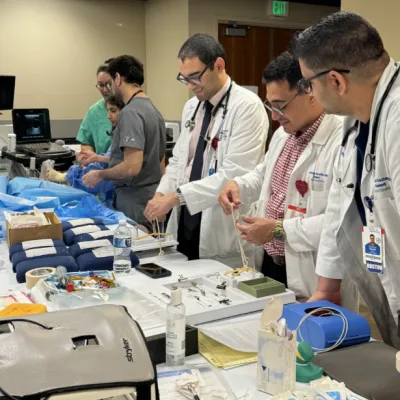
Simulation
Over the course of their training, residents will have multiple opportunities to sharpen their procedural skills not only at the bedside but also at a simulation lab located at AdventHealth Orlando at East Orlando Campus. Here residents will be trained by faculty members to practice code scenarios, perform common procedures such as central lines, lumbar punctures, etc.
Scholarly Activity and Research
Every resident is encouraged to participate in scholarly activity. Our program aims to support residents through an established Research Advisory Team. Dedicated time for scholarly activity is built into the curriculum, with the option for research electives in PGY-2 and PGY-3.
Through the AdventHealth Research Institute, residents have access to designated statisticians and grant writers for IRB protocol writing, study design, and manuscript preparation.
Every resident has the opportunity to present and attend local, national, and international conferences. Financial support is provided to those who are presenting at a conference. GME also hosts an annual research day to allow showcasing of scholarly activities.
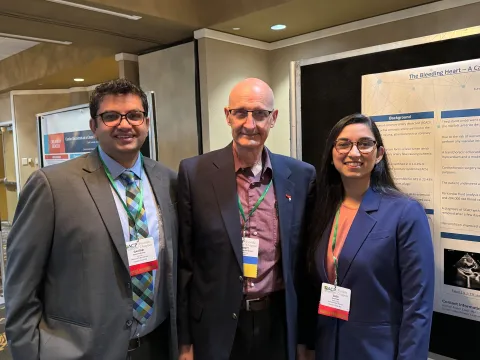
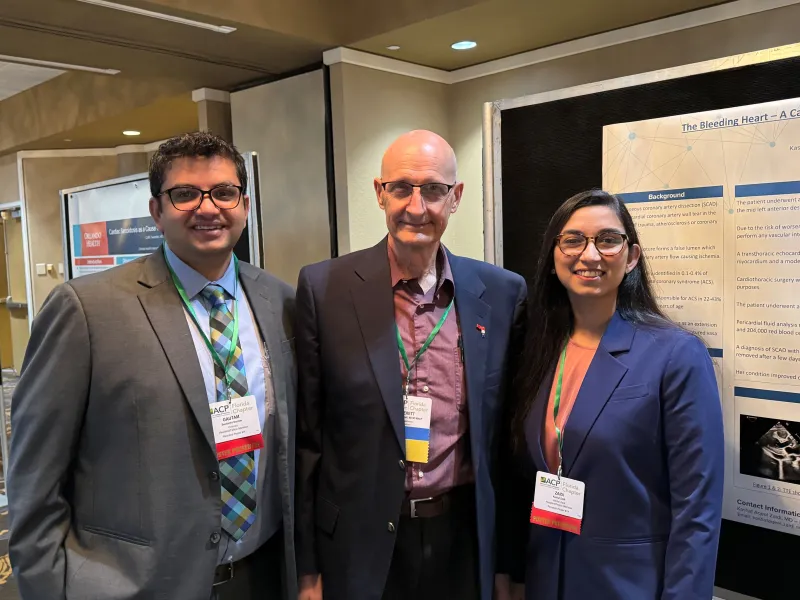
Drs. Zaidi and Gautam with our Academic Chair and Former Governor of ACP Florida Chapter, Dr. George Everett, at the ACP Florida Meeting 2024

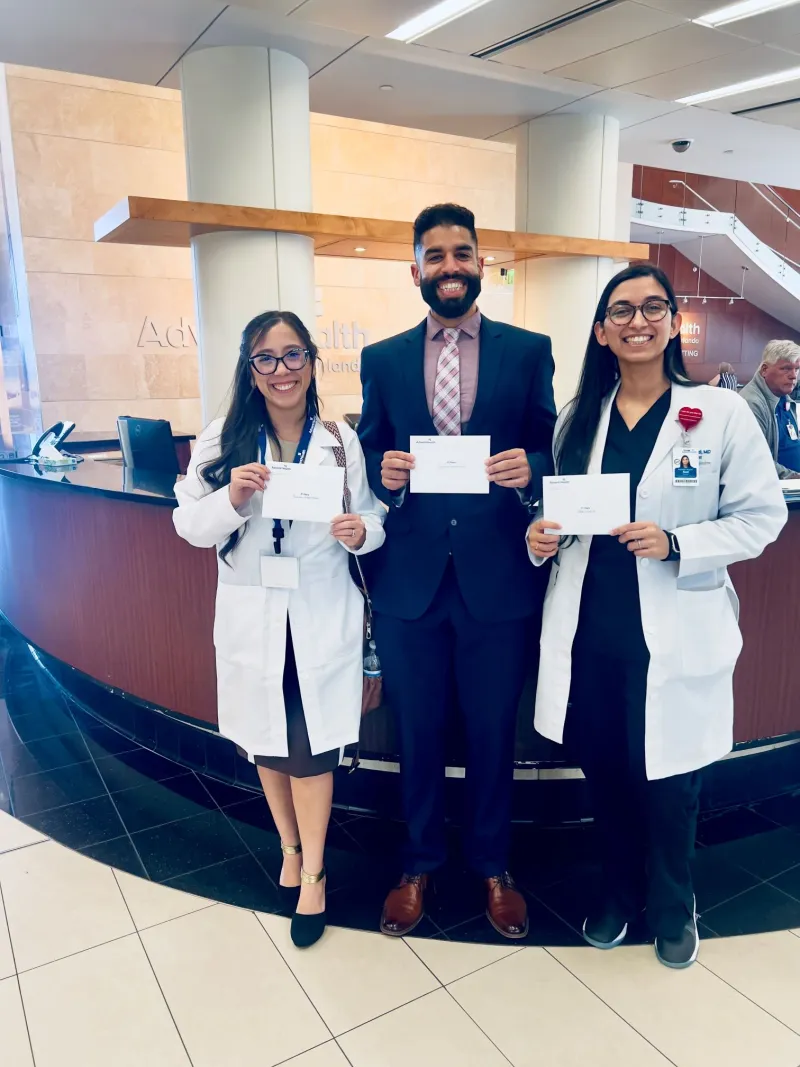
We are proud of our GME Research Day Winners - Dr. De La Hoz for Podium Presentation, Dr. Singh for Quality Improvement Project and Dr. Zaidi for Best Clinical Case

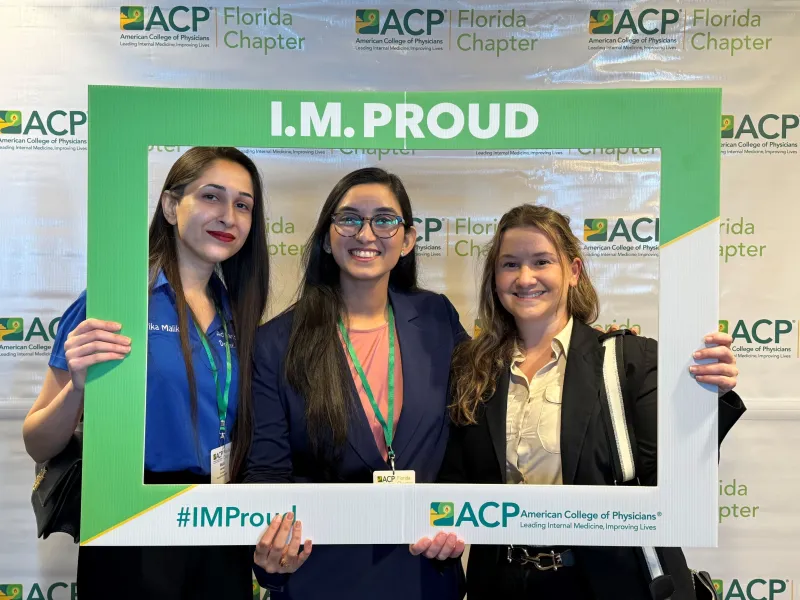
Our residents at the American College of Physicians Florida Chapter Meeting - We are all Internal Medicine proud!
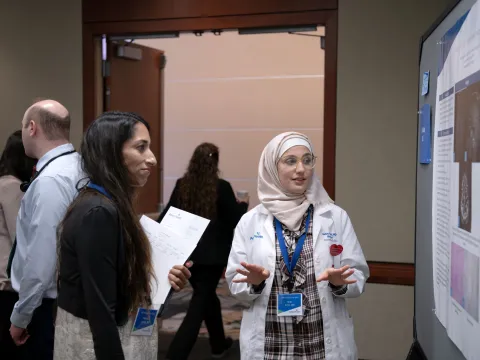
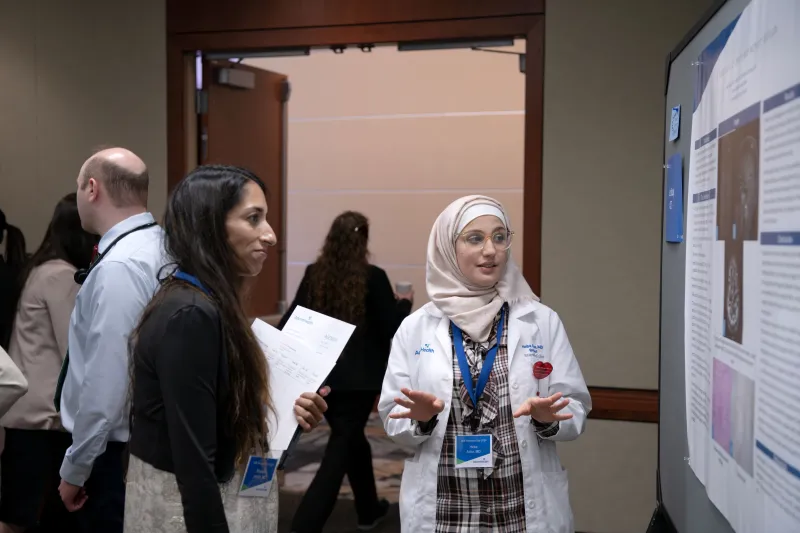
Dr. Aziza presenting her case to a judge at GME Research Day 2024

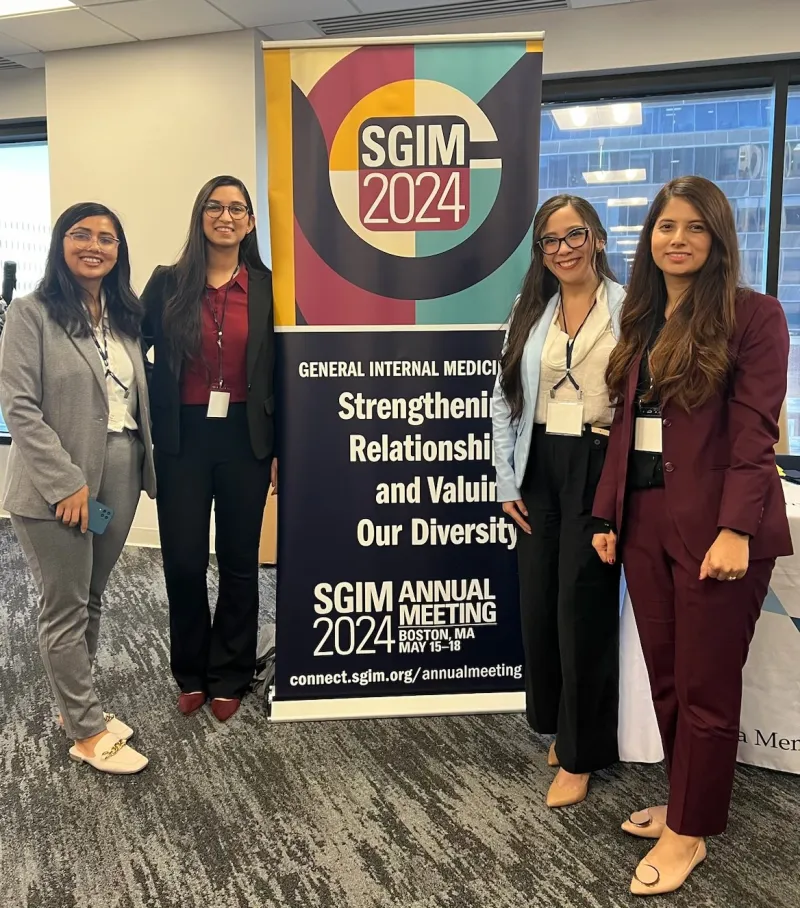
Our Resident Representatives and Poster Presenters at the SGIM Regional Meeting in New Orleans - February 2024
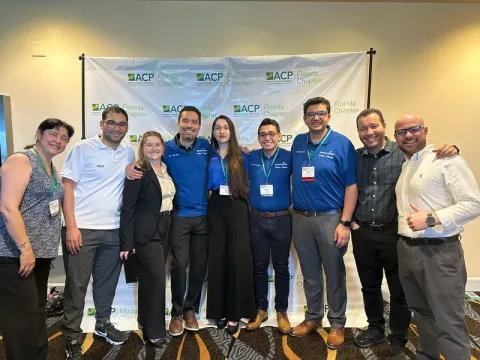
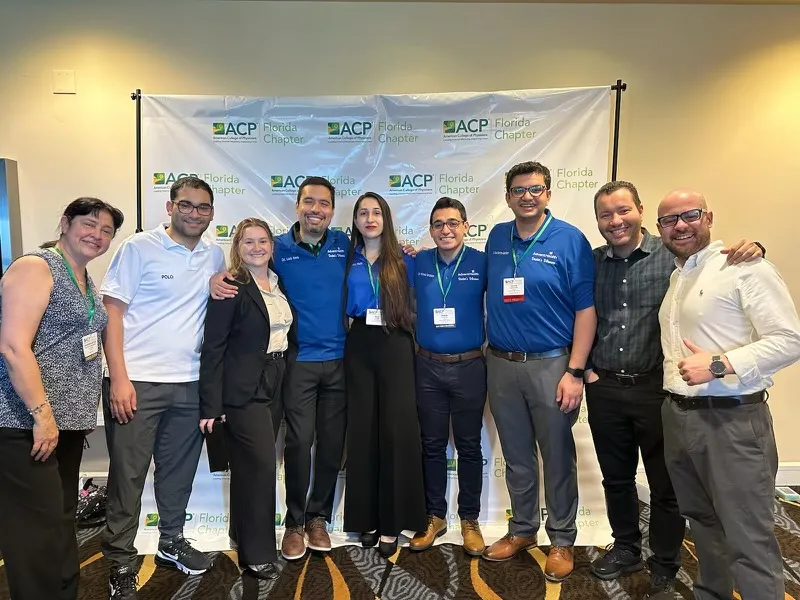
Our IMR Jeopardy Team at the ACP Florida Meeting - Spring 2024
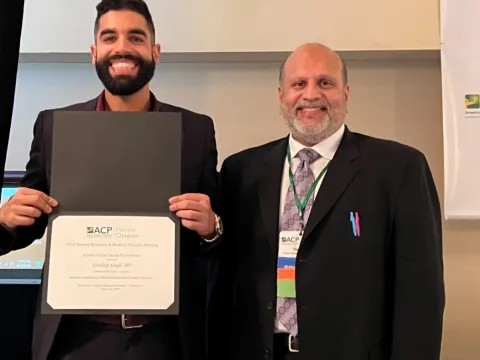
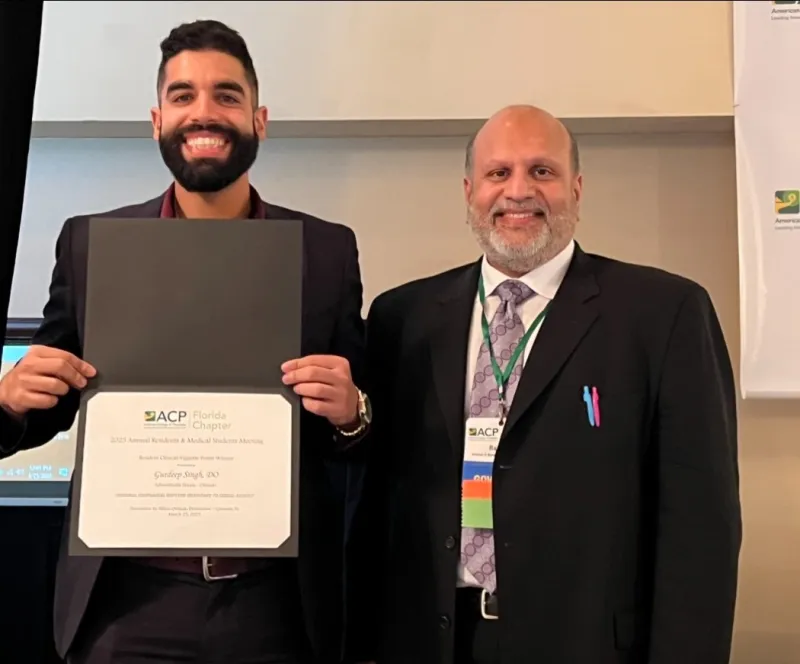
Dr. Singh receiving an award for 'Best Clinical Vignette Poster' from Dr. Ankush Bansal, Governor of the ACP Florida Chapter
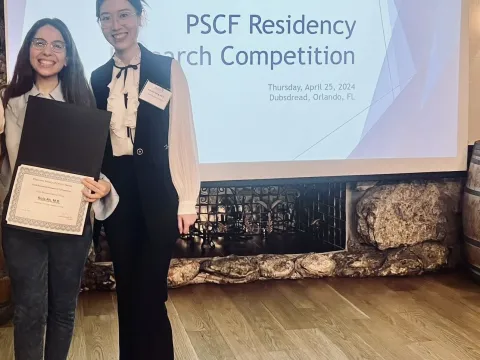
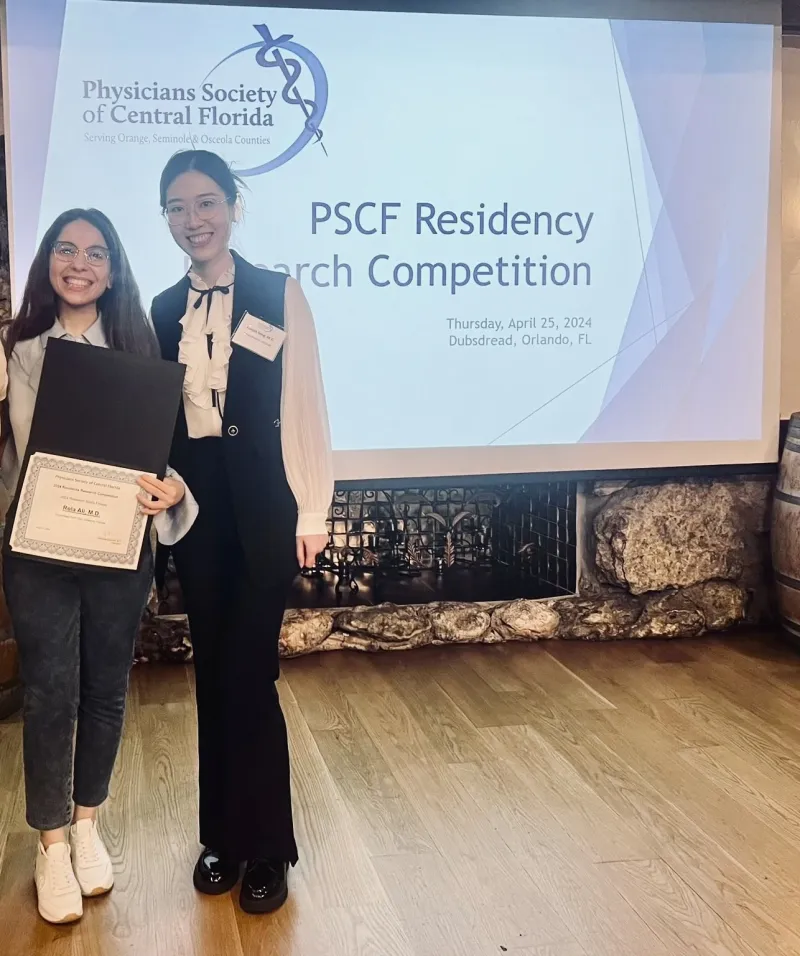
Drs. Song and Amin Ali representing our program at the PSCF Research Competition 2024
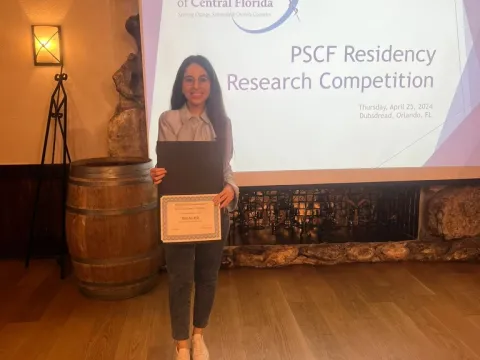
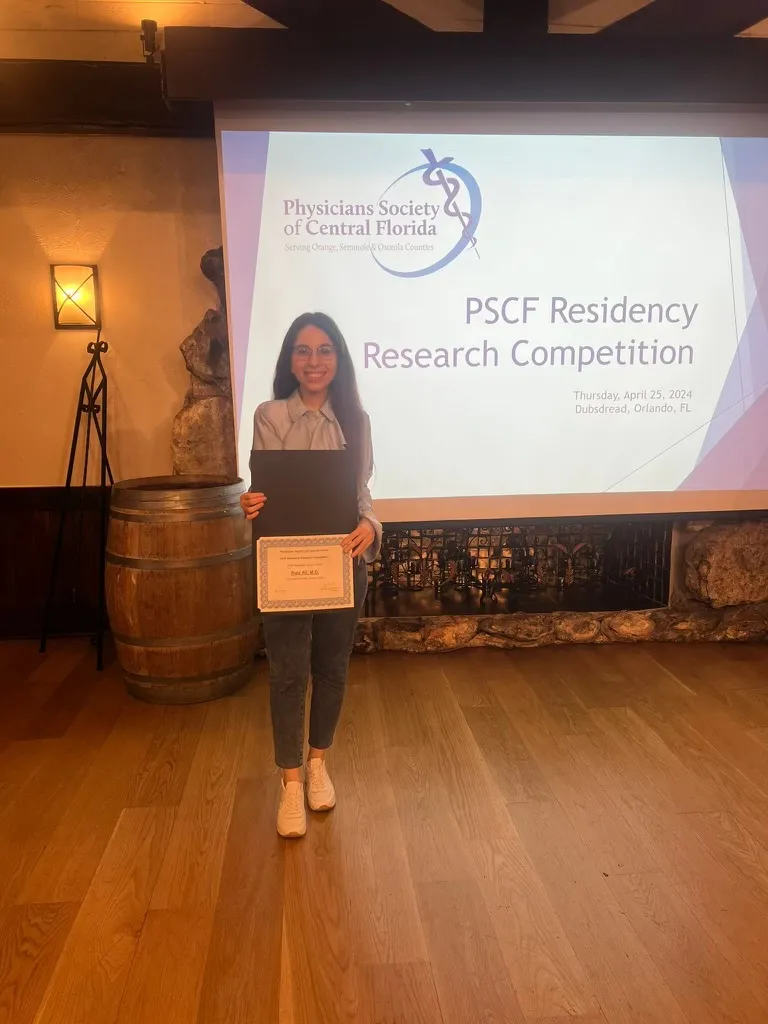
Dr. Amin Ali was one of the finalists for the Physician Society of Central Florida Research Competition 2024
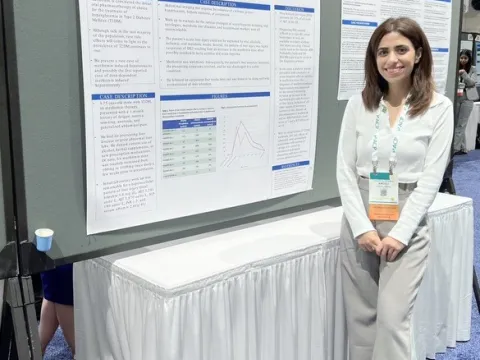
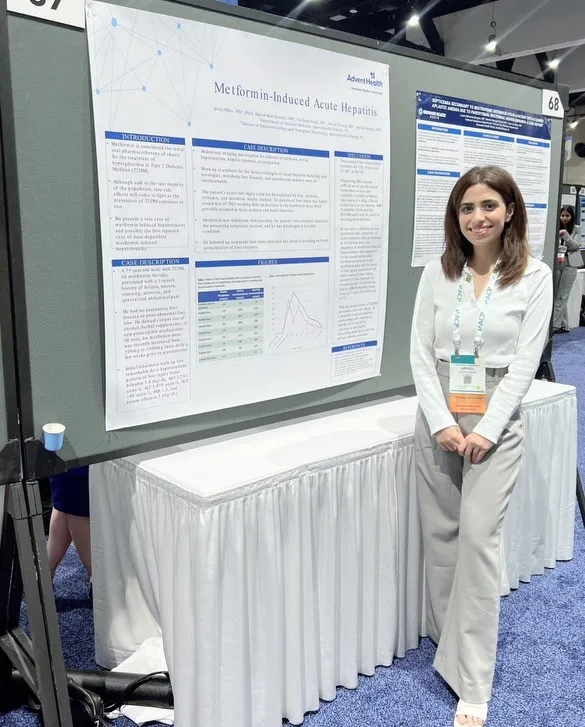
Dr. Mian with her poster titled 'Metformin Induced Acute Hepatitis' at the ACP National Meeting
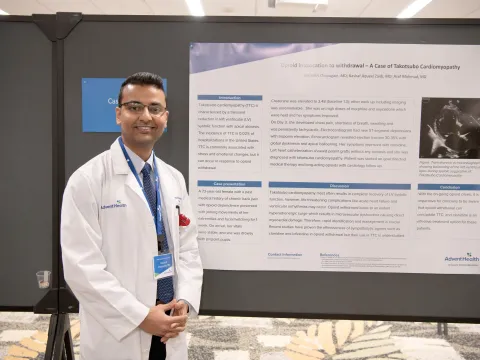
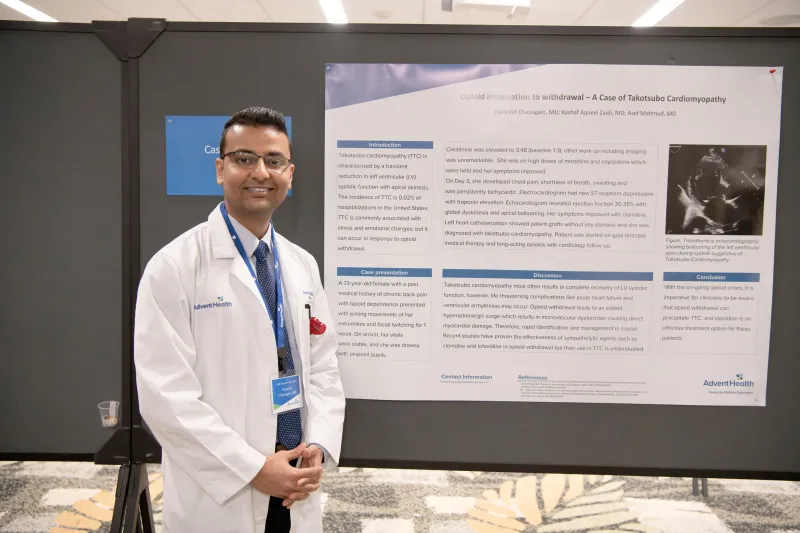
Dr. Chapagain presenting a case of Takotsubo Cardiomyopathy
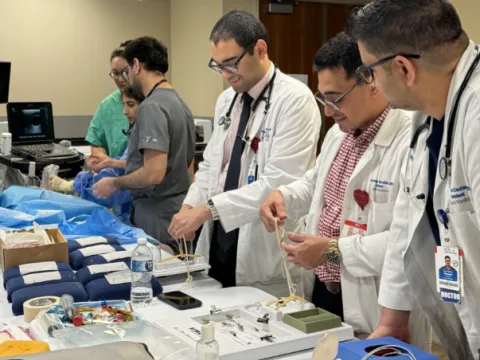
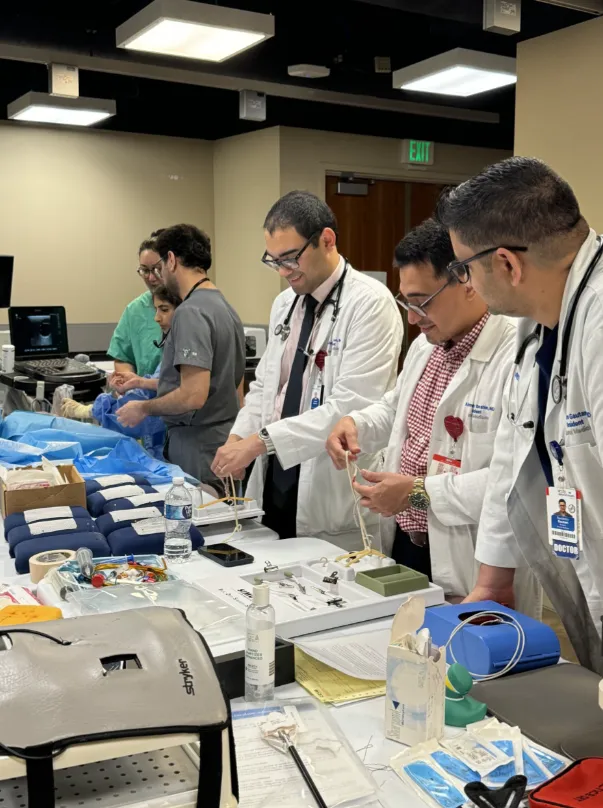
Simulation Training
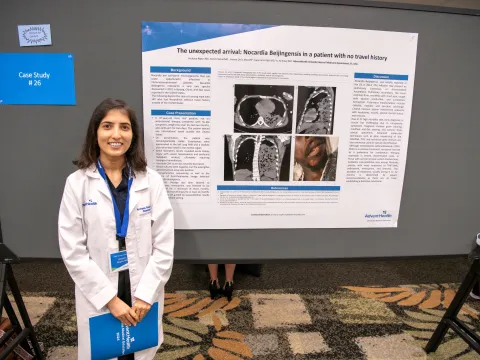
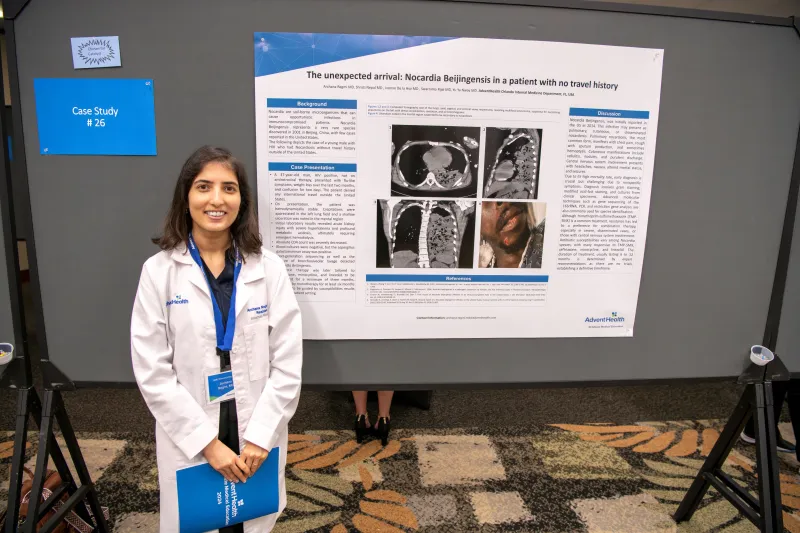
Dr. Regmi with her case presentation on a case of Nocardia
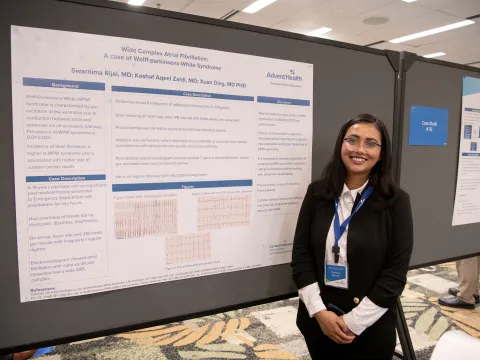
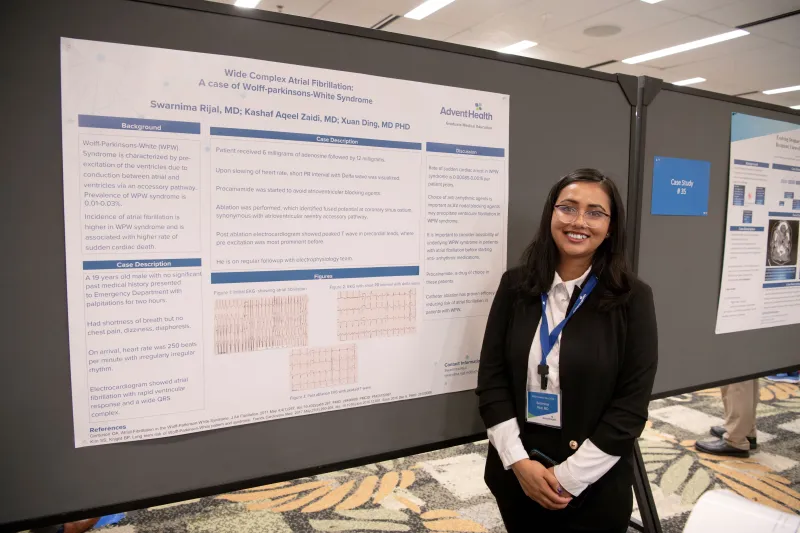
Dr. Rijal with her poster at the Research Day 2024
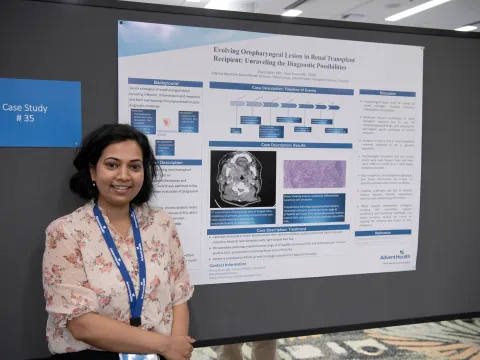
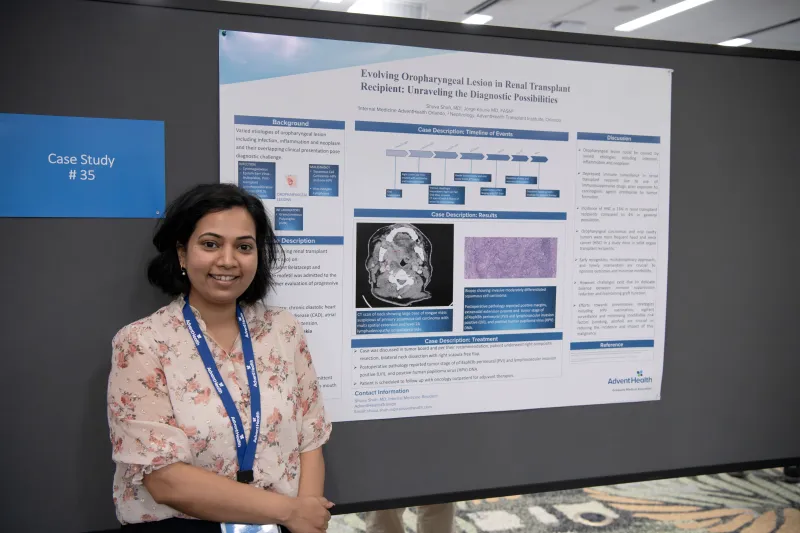
Dr. Shah with her poster at the GME Research Day!
Alumni
- Class of 2024
-
- Khaled Abdelhalem – Hospitalist at AdventHealth Apopka, Fl
- Mehreen Ali - Hospitalist – TBD
- Shammas Bajwa – Malignant Hem/Onc Hospitalist - Oklahoma University Medical Center, OK
- Jhonny Bonilla - Hospitalist - AdventHealth New Smyrna, FL
- Gabriela De La Hoz - Hospitalist - Orlando Regional Medical Center, FL
- Raphael Itzkowitz - Hospitalist - CFHP AdventHealth East Orlando, FL
- Ghaith Maksoud - Hospitalist – AdventHealth New Smyrna, FL
- Arooj Mian - Gastroenterology Fellowship at TowerHealth Reading Hospital - PA
- Phuong Nguyen - Hospitalist - CFHP AdventHealth Orlando, FL
- Sadaf Raoof - Hospitalist - AdventHealth Apopka, FL
- Robert Ryad - Rheumatology Fellowship at University of South Florida, Tampa
- Gurdeep Singh – Gastroenterology Fellowship at AdventHealth Orlando, FL
- Kathryn Slinger - Primary Care – Common Spirit Longmont United Hospital - Longmont, CO
- Tista Thapa - Hospitalist - Saint Francis Medical Centre - Monroe, Louisiana
- Class of 2023
-
- Arianne Alexander – CFHP Hospitalist Altamonte, FL
- Baha Bani Fawwaz – Gastroenterology Fellowship at AdventHealth Orlando, FL
- Samuel Brasil Sa – Cardiology Fellowship at AdventHealth Orlando - Orlando, FL
- Peter Gerges – Hepatology Fellowship at Rutgers, NJ
- Mengni Guo – Hematology/Oncology Fellowship at Loma Linda University, CA
- Syed Hashim – Hospitalist at Orlando Regional Medical Center, FL
- Yuchen Jiang – Primary Care at AdventHealth Well 65+ - Altamonte, FL
- Jieying Liu – Hematology/Oncology Fellowship at East Tennessee University, TN
- Alsayed Osman - Rheumatology Fellowship at University of South Florida - Tampa, FL
- Julio Pasos - CFHP AdventHealth East - Orlando, FL
- Syeda Rizvi – Primary Care Center at Dallas, TX
- Zain Zamir – Hospitalist at Mid Florida Hospital Specialist, AdventHealth Apopka, FL
- Na Zhou – Hospitalist group in Camden, NJ
- Class of 2022
-
- Zohaib Ahmed – Hospitalist at Brigham and Women's Hospital in Boston, MA
- Muhammad Akram – Hospitalist at Mid Florida Hospital Specialist at AdventHealth Orlando, FL
- Ahmad Almusa – CFHP at AdventHealth Orlando, FL
- Ahisan Ansari – Hospitalist at University of Iowa in Iowa City, IA
- Aimen Farooq – Gastroenterology fellowship at AdventHealth Orlando, FL
- Brandon Kalivoda - Critical Care Fellowship at AdventHealth Orlando, FL
- Daniel Kitner – Primary Care/Bariatric at Orlando Regional Medical Center, FL
- Deepak Kumar - Hospitalist at Bay Health in Milford, DE
- Alexandra Lackey – Cardiology Fellowship at AdventHealth Orlando, FL
- Aashish Mainali – Hospitalist at St. Francis Hospital in Monroe, LA
- Soheil Peiman – Hospitalist - CFHP AdventHealth Orlando, FL
- Ahmed Ramadan - Hospitalist – CFHP AdventHealth Altamonte, FL
- James Wert – Hematology-Oncology Fellowship at University of Mississippi Medical Center, MS
- James Yu – Hematology-Oncology Fellowship at University of South Florida, Tampa, FL
Program Information
- Educational Resources
-
The ACP Weekly Curriculum is the core curriculum of reading materials throughout the residency program. All residents are expected to read the topic of the week, and answer the associated short quiz online. Scores are compiled on a weekly basis and reported confidentially to the program director and the resident’s mentor. Subscription is provided free of charge to all residents. Twice a month, residents present core topics from the ACP Weekly curriculum and engage the audience in a discussion followed by a question and answer session on the particular topic.
All computers on campus provide free access to UpToDate at all times. In addition, residents will also have free access to UpToDate on their hand-held devices. The hospital also provides online access to a medical library with extensive electronic resources. Our library staff is always eager to assist with performing literature searches.
- Eligibility
-
What You'll Need
- LCME graduates:
- Pass USMLE I and USMLE II at first attempt
- Doctor of Medicine diploma without reservations
- Fluency in spoken and written English
- Proof of US citizenship or appropriate visa status (AH HR requirement)
- AOA graduates:
- Pass COMLEX I and COMLEX II at first attempt
- Doctor of Osteopathy diploma without reservations
- Fluency in spoken and written English
- Proof of US citizenship or appropriate visa status (AH HR requirement)
- International graduates:
- Pass USMLE I and USMLE II ck at first attempt (Second attempt is allowed in USMLE II cs)
- Doctor of Medicine diploma without reservations
- Current ECFMG certification
- Proof of US citizenship or appropriate visa status (AH HR requirement) (only H1-B is sponsored)
- Fluency in spoken and written English
- ECFMG certificate must be in prior to ranking.
Additional Information:
- The Program Director may permit the waiver of one or more of these criteria under special circumstances
- We will be participating in ERAS and the NRMP Match.
- Applications will only be accepted and reviewed through ERAS - please no faxes or e-mails with attachments.
- We successfully began our program in July 2009.
- We are a 16-14-14 program and will continue to expand to 16-16-16 over the next two years.
- U.S. Clinical experience is not required.
- There is no graduation cutoff date requirement.
- LCME graduates:

Application Process
Join Our Resident Team
Our program is a categorical three-year Internal Medicine Residency. We are unable to consider applicants for preliminary or "first year only" positions. Deadline for applications through ERAS by the end of December.
Our program has officially received accreditation from the ACGME. We are now in ERAS, please feel free to submit your application.
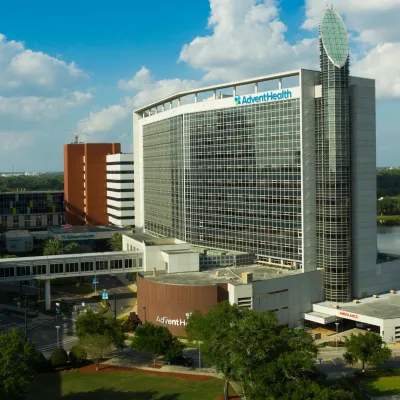
Contact Information
Jessica Tardd and Angie Benavides
Program Coordinators
2501 N. Orange Ave., Orlando, FL 32804

